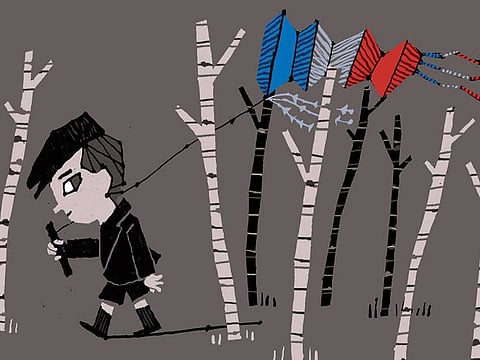When resistance began in the kitchen
The first English translation of the author’s work, a romance set during the second world war, is overdue but well worth the wait

The Kites
It seems extraordinary that Romain Gary, the Frenchman and only novelist (not to mention aviator, film director and diplomat) to have won the Prix Goncourt twice, should be strolling into English so casually and late in the day — and yet this is, according to his publishers, the first English translation of his last novel, The Kites. He was a singular figure in French literature whose non-literary claims to fame include having been married to Jean Seberg.
Penguin will shortly be bringing out a new translation of his outlandishly memorable autobiography about growing up as the only child of a questing Jewish mother but in the meantime, as an opening gambit, we have this novel Les cerfs-volants — The Kites (first published in 1980, the same year as his suicide) to detain, entertain and introduce us to him.
The Kites is set in Normandy during the Second World War and its central narrator is Ludo, nephew of local hero Ambrose Fleury, postman and gifted kite maker. Ambrose creates airborne politicians, tiny dragonflies, unruly castles in the air. He is at the service of imagination itself — but with political strings attached. At no point does one lose sight of a kite’s symbolic potential, but Gary keeps ideas (about tenacity and freedom) lightly aloft and makes sure there are no narrative dives into trees. His voice is the equivalent of a cocked hat — the narrator is a beret-wearer — and style is at a consistently jaunty angle to content (although the translation is overworked — the French original is lighter). Ludo’s attitude to the people he describes might seem superficially self-abnegating but Gary busily redresses the balance, glories in the oddity of others and never misses a comic trick.
Romance has absurdity at its core: Ludo falls in love, as a young teenager, with a girl he meets randomly in a Normandy forest. Her name is Lila, daughter of an aristocratic Polish tycoon. He waits four obsessed years before re-encountering her and, when he does, life refuses to follow a romantic script. Lila asks: “What’s wrong with you? You’ve turned green.” “I love you,” he whispers. There is a blissful eccentricity about Ludo — he puts glue in his hair when pomade is unavailable. His romancing recalls Nabokov — with jokes. The pleasure of reading is about the double take, the sense that Lila is actually self-involved, insubstantial, unworthy. At one point, Ludo likens himself to a stalk of grass held between her teeth.
As the war takes hold and France is occupied, resistance becomes the novel’s subject and it homes in on the efforts of a master chef at the local restaurant, the Clos Joli, for whom French cuisine becomes a form of protest (the novel is a discreet love letter to France). It is a rash, playful book, yet dark too. The second half is dominated by a splendid, larger-than-life character: Madame Julie Espinoza, a Jewish prostitute with a lizard brooch on her bosom (a symbol of her constantly slinking out of trouble) who transforms herself into Princess Esterhazy — she knows about the survival of the sharpest, duping the Nazis with aplomb.
It is fascinating to see Espinoza shed her former self and become a fiction. And, meanwhile, Uncle Ambrose confesses to his nephew that he has, all his life, been in love with an imaginary woman. Gary writes wonderingly, as if he cannot quite believe what his characters are getting up to, and points out a connection between “dreaming and rebellion”. What emerges, overwhelmingly, is the sense that, in Gary’s hands, fiction itself is a form of resistance.
–Guardian News & Media Ltd


